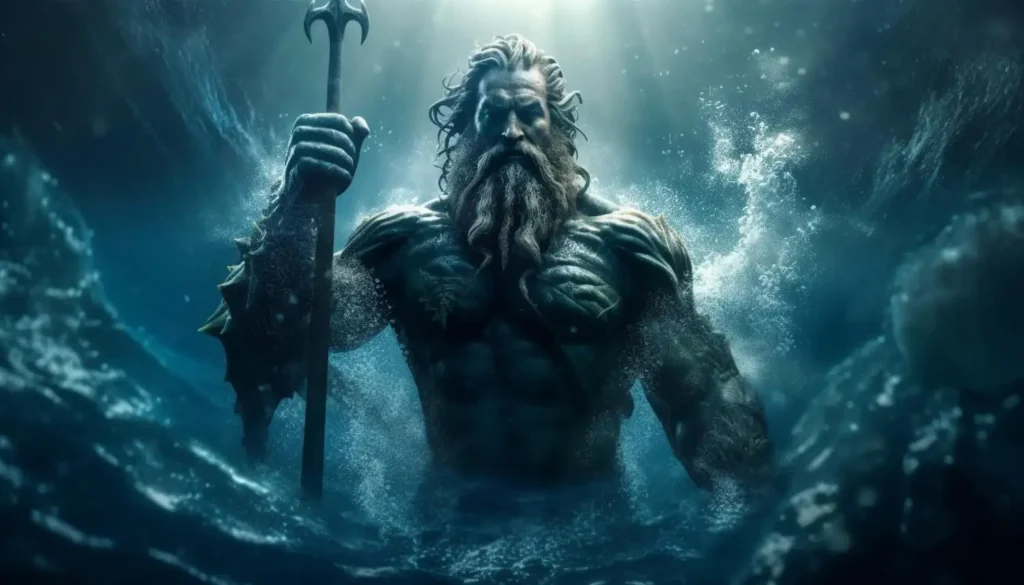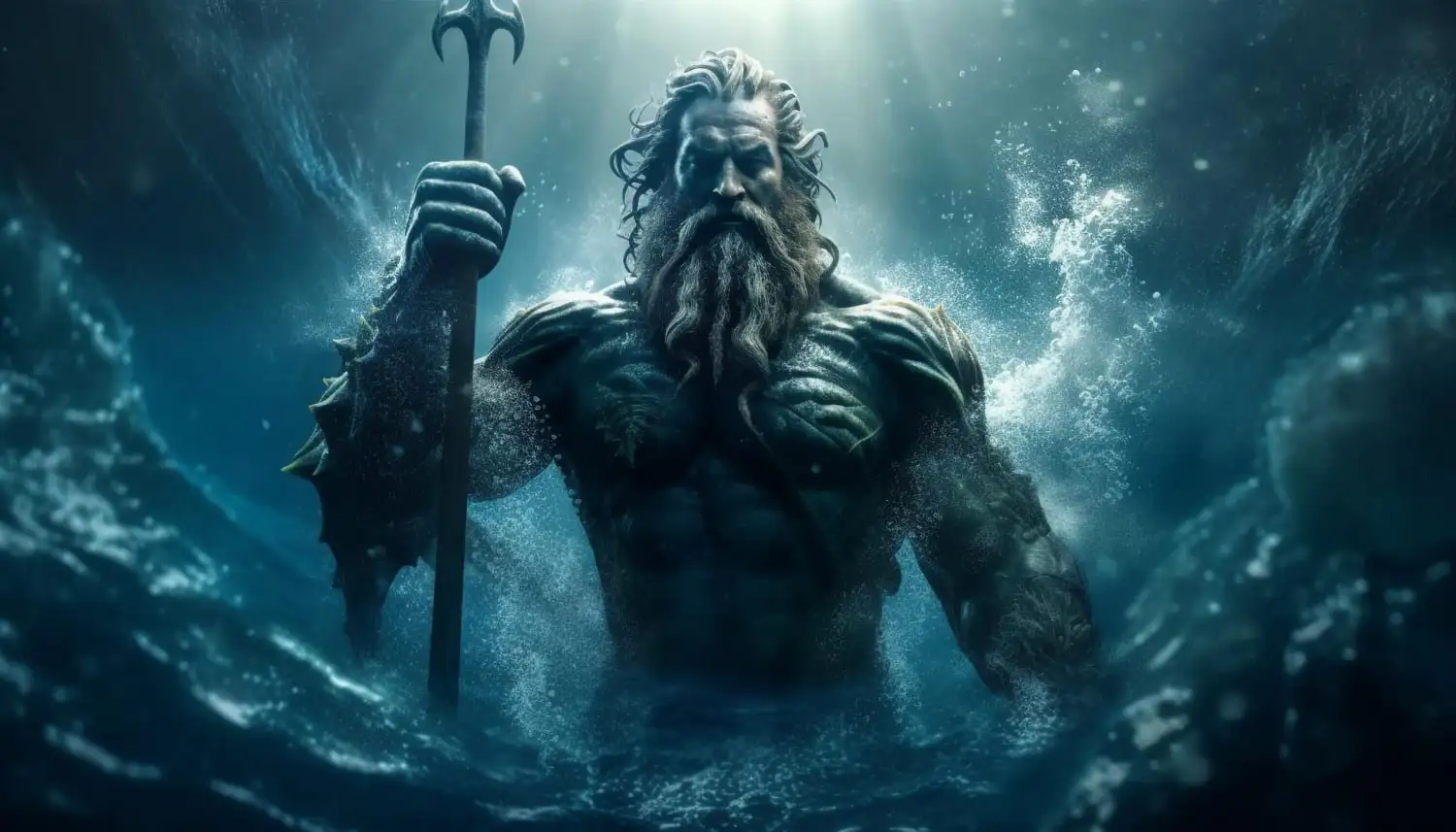Ancient Greek mythology is filled with gods and goddesses who rule over various aspects of the natural world. Among them, Poseidon stands out as one of the most powerful and influential deities. Poseidon god of the sea, holds a prominent place as one of the twelve Olympian gods. Poseidon’s influence extends far beyond his aquatic realm.
This article delves into the origins and life phases of Poseidon, shedding light on the fascinating character that embodies both power and unpredictability.

Table of Contents
Origins of Poseidon
Poseidon, also known as Neptune in Roman mythology, was born to Cronus, the god of time, and Rhea, the fertility god, making him a brother of zeus and Hades. He belonged to the second generation of Titans and was one of the six children of Cronus who escaped being swallowed by their father.
Zeus, Poseidon’s brother, rescued him and together they waged war against their father and the Titans. In this battle, known as the Titanomachy, the Olympians emerged victorious, and the siblings divided the cosmos amongst themselves. Poseidon was granted dominion over the sea, making him the ruler of all marine life. Poseidon’s realm of influence extended beyond just the sea; he was also associated with earthquakes, storms, horses, and rivers.
The Life Phases of Poseidon God of the Sea
- Childhood: During his childhood, Poseidon displayed a strong connection with the sea. He would spend hours exploring its depths and interacting with its inhabitants. As he grew older, his affinity for water became more apparent, and his powers continued to develop.
- Ascension to Power: As Poseidon matured, he sought to establish his authority over the sea. He engaged in various conflicts with other sea deities to solidify his control. These battles often resulted in catastrophic storms and violent waves, showcasing his unrivaled power and ability to shape the sea to his will.
- Relationships and Offspring: Poseidon had numerous relationships with both mortal and immortal beings. His most well-known consort was Amphitrite, a sea nymph whom he married after a prolonged courtship. Together, they had several children, including Triton, a merman who became a herald of the sea. Another notable affairs include encounters with Medusa, resulting in the birth of Pegasus, the winged horse, and Chrysaor, a fearsome warrior. Poseidon fathered many other legendary creatures and demigods, such as the Theseus, Cyclops, Polyphemus and the sea nymph Thoosa.
- Influence on Mortals : Influence Poseidon god of the sea extended beyond the sea and into the mortal realm. Sailors and fishermen worship of poseidon and relied on his benevolence for safe voyages and bountiful catches. Cities near the coast often built temples in his honor, seeking his protection and favor. His trident, a three-pronged spear, became an iconic symbol of his power and authority over the sea. However, Poseidon’s wrath could also be unleashed upon those who defied him. He known for his temperamental nature. He was quick to anger when his authority over the sea was challenged or disrespected. According to legend, he caused storms and shipwrecks as punishments for those who offended him. However, Poseidon could also be benevolent; he was credited with creating islands and springs and guiding sailors safely through treacherous waters.
Poseidon’s Contest with Athena
One of the most well-known stories involving Poseidon god of the sea centers around his rivalry with Athena, the goddess of wisdom and warfare. Both Poseidon and Athena desired to become the patron deity of Athens. As part of a contest to win this honor, Poseidon struck the grounds with his trident, causing a spring to gush forth. However, Athena, in her wisdom, planted an olive tree on the same spot. The people of Athens chose Athena’s gift of an olive tree over Poseidon’s spring, making her their patron deity.
The Creation of Horses
Poseidon’s association with horses is another significant aspect of his mythology. According to legend, Poseidon created horses by striking his trident against a rock. This act caused a spring to gush forth, producing magnificent horses that became symbols of strength and agility. Horses held great importance in Greek society, serving as symbols of power in warfare and transportation.
Conclusion
Poseidon, god of the sea, is a complex and powerful deity in Greek mythology. From his origins as the offspring of Cronus and Rhea to his ascension as the ruler of the sea, Poseidon’s life phases reveal a character both unpredictable and awe-inspiring. His influence on mortals and his interactions with other gods showcase his importance in Greek mythology. Whether bestowing blessings or unleashing his wrath, Poseidon’s impact on Greek culture is undeniable, making him a central figure in the pantheon of gods.
Poseidon’s stories captivated ancient Greeks and continue to fascinate people around the world today, serves as a reminder of the vast power that lies within the seas and the mysteries that lie beneath its depths. Even today, Poseidon’s name is synonymous with the ocean and his image continues to be depicted in art and popular culture. His legacy endures as a symbol of power, authority, and the mysteries of the deep sea, reminding us of the eternal forces that shape our world.


